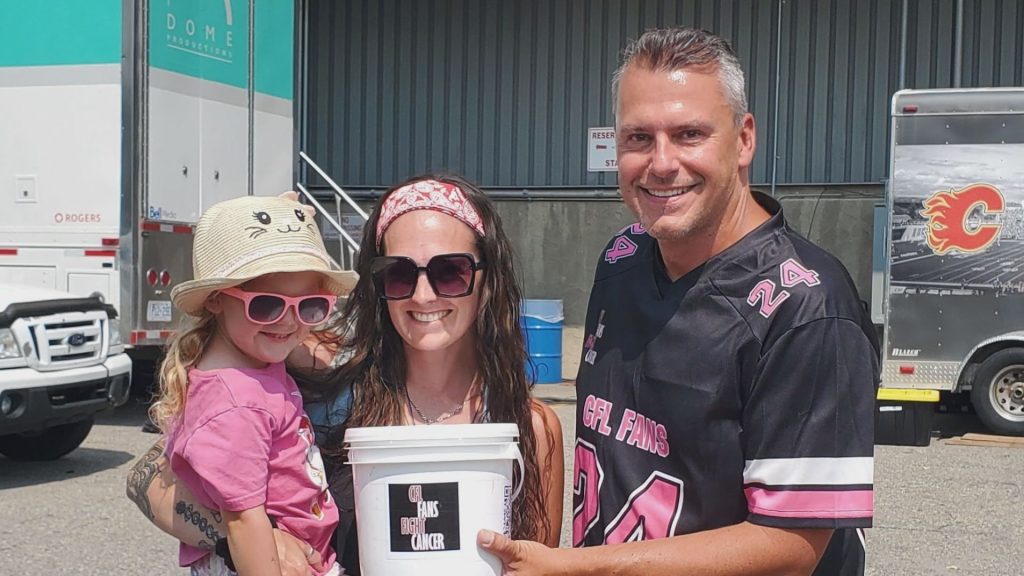How Ryan Reynolds’ potentially life-saving bet is a ‘vital’ health lesson for Canadians
Posted September 16, 2022 12:20 pm.
Last Updated September 16, 2022 5:52 pm.
A bet involving actors Ryan Reynolds and Rob McElhenney, who are currently starring in the docuseries Welcome to Wrexham, is showcasing how proactive screenings and colonoscopies can help cut the risk of colorectal cancer.
In a video released on Reynolds’ Twitter account on Tuesday, it shows the two actors sitting side by side talking about a bet involving McElhenney’s ability to learn Welsh (the two bought the football club Wrexham A.F.C. in North Wales).
After reciting a couple of lines, it cuts to Reynolds entering a hospital for the procedure.
“I would never normally have any medical procedure put on camera and then shared. It’s not every day that you can raise awareness about something that will most definitely save lives,” he said.
“That’s enough motivation for me to let you in on a camera being shoved up my ***.”
The video showed Reynolds being wheeled down a hallway before cutting to him in a recovery room. A doctor at the hospital entered the room to inform him of the results.
RELATED: Ryan Reynolds, Rob McElhenney complete takeover of Welsh club Wrexham
“You did such a good prep that I was able to find an extremely subtle polyp that was on the right side of your colon. This was potentially lifesaving for you. I’m not kidding. I’m not being overly dramatic,” the doctor said.
“This is exactly why you do this, OK. You had no symptoms.”
“Thank you so much for this, seriously. Thank you for pushing me to do this,” Reynolds said to the doctor in response.
When some polyps are discovered, as Colorectal Cancer Canada notes, it means there could be ties to colorectal cancers.
McElhenney also had a colonoscopy done and a doctor informed him three small polyps were found and removed.
The video — produced in partnership with LeadFromBehind, an initiative by the Colorectal Cancer Alliance — ended with a message encouraging people 45 and older to ask a doctor about getting a colonoscopy, noting that “colon cancer is preventable.”
As of Friday afternoon, the video was viewed more than a million times on Twitter and it received thousands of retweets and 20,000 likes.
I made a bet. I lost. But it still paid off. @LeadFromBehind @RMcElhenney @DrLaPook @NYULangone @RMcElhenney pic.twitter.com/UJiwRY0QoS
— Ryan Reynolds (@VancityReynolds) September 13, 2022
Ryan Reynolds praised by advocates for raising awareness of screening, colonoscopies
Dr. Sandra Krueckl, the executive vice-president of mission, information and support services with the Canadian Cancer Society, said she saw the video online and that there was a “vital lesson” to come out of it.
“It’s always really wonderful to see somebody like Ryan Reynolds use his platform to encourage people to improve their health and take actions that will make a difference,” she told CityNews.
“What we know for sure at the Canadian Cancer Society is that you have to speak about these messages around what people can do to improve their health on a regular basis for it to sink in. There’s a lot of information out there in the world and for people to remember and to know when they reach a certain age, they should participate in a screening program.”
It’s a sentiment that was echoed by Dr. Catherine Dube, the ColonCancerCheck clinical lead with Ontario Health.
“It’s super. We always love there to be some attention to the importance of colon cancer screening,” she said in an interview.
“This video in a way brings it nicely because it’s just someone we see as otherwise really healthy and successful, and we don’t anticipate that Ryan Reynolds would have issues. And he’s saying, ‘My health is important and I want to be screened.'”
What are the guidelines for screening and how severe is colon cancer?
While both doctors praised the video, they noted two key differences between screening in Canada and the United States. They said the guidelines for screening in the U.S. encourage people 45 and older (Reynolds and McElhenney are 45) to get screened while in Canada it’s recommended for people 50 and older.
Dube said while there have been increased instances of colon cancer in people younger than 50 in recent decades, she said the population between 50 and 74 is the biggest source of concern.
“Ninety per cent of the colon cancers occur in people over 50 and the chances of someone less than 50 remains extremely low,” she said.
“Four out of 10 of these people (between the ages of 50 and 74) have either never screened or (are) overdue for their screening … There’s so much work to be done in the people who we know are truly at risk.”
Krueckl and Dube also said in Ontario and other parts of Canada, a portable, mailed-out and much less intrusive test is the primary mode of screening before a colonoscopy is done.
Known as a fecal immunochemical test (FIT), people need to take a small swab of fecal matter at home and apply it to a specimen holder. It can be mailed back in. They said the test, which should be taken every two years, effectively gathers tiny traces of blood that come from colorectal cancer or polyps (growths or thickening of the lining in the colon) that are pre-cancerous.
Generally speaking, only people who have “abnormal” FITs or those with an immediate family history of colon cancer will need colonoscopies.
RELATED: Vancouver actress diagnosed with colon cancer at 30 speaks on bias in health system
“Up to the age of 50, a third of people will have small bumps in their colon and not all of these lesions will ever grow. And so the attention of screening should not be on picking up every small bump, the attention on screening is to flag those people who will benefit from … a colonoscopy,” Dube said.
“People with an abnormal FIT test in Ontario, eight out of 10 will have some polyps and up to a third of them will have an advanced polyp – one that we feel makes a super big difference to remove from the colon.”
When it comes to colon cancer, Dube said it’s detected many times in people without a family history. She also emphasized how it ranks higher compared to certain other cancers.
“It’s the third-most common cancer being diagnosed in Ontario (and) the second-most common cause of dying from cancer in Ontario,” Dube said.
She said around 9,300 people are diagnosed with colon cancer annually and about 3,500 people will die each year from the disease.
“The earlier we pick it up, the more likely we are to cure someone from it, that’s why screening is so important … If it’s picked up late, more chances that it has actually spread and the odds of curing you from the disease is much less,” Dube said.
Abdominal pain, obvious bleeding, blocking of the bowel or changing bowel movements and bloating are the most common symptoms.
Tests can be asked for through a person’s family doctor or for those without a doctor they can call 811 to ask. Krueckl also encouraged people to think and ask about breast, cervical and prostate testing.
How COVID-19 impacted preventative cancer testing in Ontario
Krueckl and Dube both noted that 2020 saw a heavy impact on cancer screenings with those services being shut down in Ontario for several months and since then there has been a growing effort to ensure people are getting screened.
With respect to colon cancer screening, Dube said there has been good and bad news on that front.
“By earlier this year we were seeing more FIT screening than was done prior to the onset of the pandemic, we’re really happy about that,” she said.
“But the net effect on screening when we look at the proportion of people in Ontario who should screen and who haven’t, this is still higher than it was, it’s still not where we want it to be.”
RELATED: Increase of severity in childhood cancers ‘tragic consequence’ of diagnosis delays during pandemic, oncologist says
Dube said medical professionals are aiming to close the gap of four out of 10 people in need of screening down to two out of 10.
In the first three months of 2022, Dube said approximately 400,000 FIT kits were mailed out and processed. While it’s projected there will be around 1.6 million tests done by the end of the year, she said that number is fluctuating.
“We really encourage people if you’re 50 and older and if you haven’t been screened, if you missed your screening with concerns with COVID, the screen systems are up and running. And they’re safe and they have COVID protocols,” Krueckl said.








